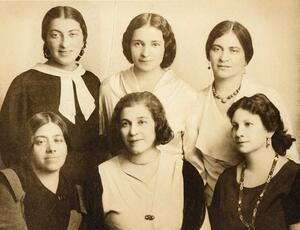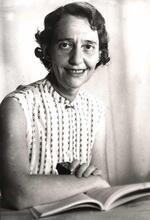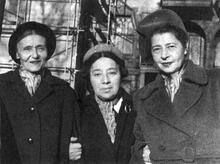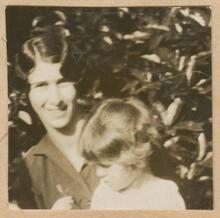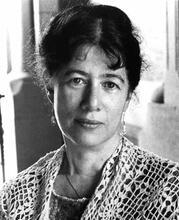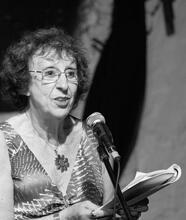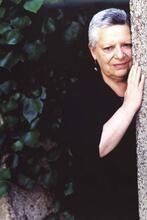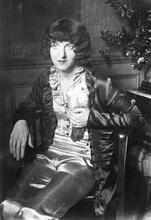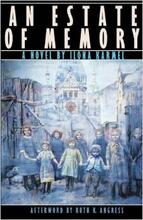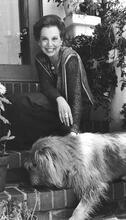Sarah Reisen
Sarah Reisen was both a gifted Yiddish writer in her own right and a respected translator of great literature into Yiddish for children and adults. Reisen's poems and short stories appeared in Yiddish newspapers in Russia, Britain, and America. Reisen earned respect for her Yiddish translations of Gogol, Pushkin, and Tolstoy. She adapted Oscar Wilde and Daniel Defoe for use in Yiddish schools and wrote several children’s books in Yiddish, including Der Ber un dem Veshuvniks Dray Techter (The Bear and the Villager’s Three Daughters). In 1933, as a divorced single mother, she moved to New York, where she continued to support herself as a writer and language tutor. She published two collections of poetry: Lider in 1924 and Lider fun Sore Rayzen in 1955.
Sarah Reisen was a member of an illustrious Yiddishist literary family whose reputation she maintained by her multiple talents as a poet, fiction writer, translator, and children’s author. Recognized by contemporaries for her humane literary sensibility, she brought to Yiddish literature not only her own creative works but also her translations, which introduced readers of all ages to world literature.
Early Life and Family
Reisen was born in 1885 in Koydenov, White Russia, to a distinguished family. She received a rich and varied education: a rabbi’s wife taught her basic Hebrew; her father, Kalmen Rayzen, a writer and freethinker, instructed her in the weekly Torah she-bi-khetav: Lit. "the written Torah." The Bible; the Pentateuch; Tanakh (the Pentateuch, Prophets and Hagiographia)Torah portions; from her scholarly and pious mother, Kreyne Epshtayn, she learned German; and a (Yiddish) Small-town Jewish community in Eastern Europe.shtetl teacher tutored her in Russian.
Her mother died when Reisen was ten. Briefly, she lived in Vinitze with her father and brothers, Abraham and Zalmen, and then with her older sister in Mohilne. In 1899, at fourteen, she moved to Minsk, where she worked as a seamstress, concurrently continuing her studies. Thereafter, she earned a precarious livelihood as a tutor of Russian. Reisen married the writer David Kasel in 1904 and had a son, Moishe Reisen-Kasel; the marriage ended in divorce. She shuttled between Warsaw, Minsk, and Vilna, and finally, in 1933, immigrated to New York.
Literary Career
Reisen’s literary career was launched in Minsk, when she was seventeen, with the publication of a sketch in Russian and a translation of I.L. Peretz. She joined the Yiddish literary circle, which included Rokhl Brokhes.
Sometimes under the pen name of Sarah Kalmens (derived from her father’s name), her sketches, short stories, and poems appeared in such periodicals as the Bundist Di Folkstzaytung, Der Veg, Der Fraynd, and her brother Abraham’s publication, Eyropeyishe Literatur. Her work also appeared in the Yiddish presses of London and New York: the Forward (which serialized her novels), Di Tsukunft, Amerikaner, and Feder. She also wrote, translated, and performed in theater pieces.
Reisen’s first Yiddish translation was published by her brother Abraham in Dos Yidishe Vort [The Yiddish word], followed by her highly acclaimed translation of Gogol’s “The Overcoat.” Between 1922 and 1929, she translated the works of Turgenev, Pushkin, Andreyev, Tagore, and Tolstoy, among others.
Her contribution to children’s literature was significant, and included original stories and adaptations, legends, and poetry. Her books for children included Der Ber un dem Veshuvniks Dray Techter [The bear and the villager’s three daughters] and Bobe Yakhne un Meyshele. Once a teacher herself, Reisen adapted works by Oscar Wilde and Daniel Defoe for use in Yiddish schools.
Poetry and Legacy
Her poetry was published in Korman’s Yidishe Dikhterins Antologye, Basin’s Amerikaner Yidishe Poezye, and Rozhansky’s Di Froy in der Yidisher Poezye. Kholem un Vor [Dream and reality] is a collection of her early writings. Her first poetry collection, Lider, appeared in 1924 in Vilna; another volume, Lider fun Sore Reyzen, was published in 1955 in New York.
Reisen was a lyrical poet who spoke from the heart in the unmediated, modest language of love, abandonment, loneliness, and the wonders of the world—natural and human. A maternal figure in the Yiddish literary world, she stands as a sustaining link in the chain of Yiddish literature.
Sarah Reisen died in New York City on October 25, 1974.
Basin, Moyshe. Amerikaner Yidishe Poezye [American Yiddish poetry] (1940).
Grobard, B. “Lider fun Sore Reyzen” [Poems by Sarah Reisen]. Di Tsunkunft [The future] 61, no. 3 (March 1956): 138.
Korman, E. Yidishe Dikhterins Antologye [Yiddish poetesses anthology] (1928).
Leksikon fun der nayer yidisher literatur [Lexicon of new Yiddish literature]. Vol. 8 (1968).
Rawitch, Melech. Mayn Leksikon [My Lexicon]. Vol. 4, Book 2 (1982).
Reizen, Zalman. Leksikon fun der Yidisher Literatur, Prese, un Filologye [Lexicon of Yiddish literature, press, and philology]. 2d ed. (1929).
Rozhansky, Shmuel, ed. Di Froy in der Yidisher Poezye [The woman in Yiddish poetry] (1966).
UJE.

